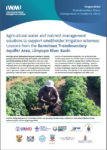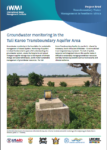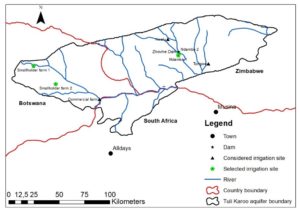The Tuli Karoo is a transboundary aquifer shared between Botswana, South Africa and Zimbabwe. Work on characterising transboundary aquifers has been steadily progressing in the southern African region, with significant contribution from the International Water Management Institute (IWMI). Studies in the Ramotswa Aquifer (Botswana and South Africa) and in the Shire River Aquifer System (Malawi and Mozambique) are near completion and have contributed toward conjunctive water management of these transboundary systems. Work on the Tuli Karoo still in its early stages endeavours to enhance management of the Tuli Karoo System and lesson learn across the three geographies.
The trip, which included meetings in Gaborone, Palapye, Bulawayo and a field trip into the Zimbabwe portion of the Tuli Karoo Aquifer, took place from 25-29 March 2019. The IWMI research team led by Jonathan Lautze, consisted of Manuel Magombeyi and Patience Mukuyu. Meetings were held with government officials in Gaborone (Department of Water and Sanitation) followed by a meeting on the following day, with officials from the Zimbabwe National Water Authority and the Ministry of Lands, Agriculture, Climate, and Rural Resettlement in Bulawayo, Zimbabwe. These meetings served to cement the project objectives with the two governments and also to map out actions to achieve these objectives, particularly relating to data collection. Zimbabwe government officials led the team through areas of interest overlaying the Tuli Karoo.
Notably, stretches of dry water courses marked the landscape, showing the dire surface water situation in the area. Rivers such as the Shashe, uMzingwane and Zhovhe, among others, were largely stretches of sand. Here, rivers are ephemeral and flow for small periods during the rainy season, consequently the population largely depends on groundwater for domestic water supply as well and for small scale agriculture. The Zhovhe dam, the largest in the study area, provides a source of water for irrigation for small holder farmers and domestic water supply to the town of Beitbridge.








